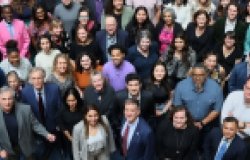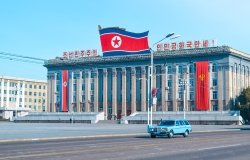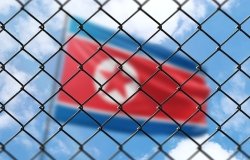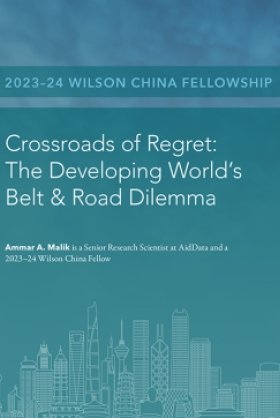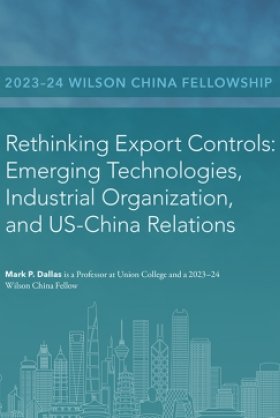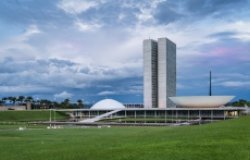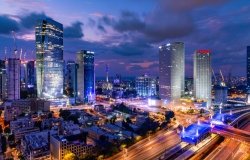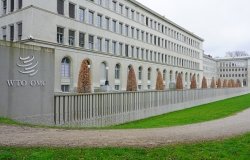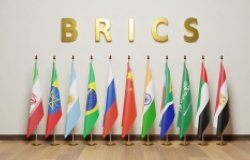Foreign Policy Challenges in the 112th Congress: The Global Economy
Experts will discuss how key regions such as China and Europe as well as issues such as immigration and urban growth affect U.S. trade and finance policy.
Overview
The ability of the United States to compete in an increasingly global economy is a challenge that underlies many of the pressing issues facing the 112th Congress. In the first session of a Wilson Center on the Hill two part series on foreign policy challenges facing the 112th Congress, Wilson Center experts discussed how economic developments in key regions such as China and Europe as well as issues such as immigration and urban growth are likely to affect U.S. trade and finance policy. The session was moderated by Michael Van Dusen, Acting President and Director, Woodrow Wilson Center.
Noting that is virtually impossible to draw a line between what is domestic and what is international,Kent Hughes, director of the Program on America and the Global Economy, described several of the key issues that will influence American foreign policy and economic relations with others. On the trade front, the President is likely to propose congressional action on the three yet to be ratified Free Trade Agreements (FTAs) with South Korea, Colombia, and Panama. Other key trade issues may emerge if progress is made on the Doha Round of trade negotiations, and it remains to be seen whether Japan will join negotiations for a trans-Pacific partnership which were started by the George W. Bush administration. In addition economic relations with China and India, particularly on the issue of Chinese currency practices will remain significant. Hughes noted that the United States and the rest of the world continue to feel the effects of the financial crisis and there is no consensus that the changes to the financial regulatory structure that have been made are sufficient to prevent and address future problems. The debate will continue over what reform is necessary, and in the United States, that debate might include possible modifications to the Dodd-Frank bill. Globally, the debate will likely examine the makeup of the global financial system and the structure of the international regulatory system.
Sonya Michel, director of the Wilson Center's United States Studies program, outlined challenges posed by the current immigration system and steps that could be taken to produce a more effective and flexible workforce. Michel noted that immigration is key to strengthening American economic competitiveness and meeting America's 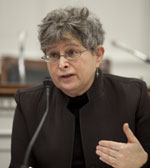 needs, but also to strengthening other countries through the education of their people so that those countries can then stand up for democracy. She proposed that immigration be thought of as "not a one-way street," but instead a more flexible system where individuals can come to the U.S. to study, take their skills back to their home countries, and perhaps return again to the U.S. at some point in the future. The disruption of people and families caused by the current system can be harmful both to the broad goal of development. Instead, she asked, "Why not allow these people to circulate?"
needs, but also to strengthening other countries through the education of their people so that those countries can then stand up for democracy. She proposed that immigration be thought of as "not a one-way street," but instead a more flexible system where individuals can come to the U.S. to study, take their skills back to their home countries, and perhaps return again to the U.S. at some point in the future. The disruption of people and families caused by the current system can be harmful both to the broad goal of development. Instead, she asked, "Why not allow these people to circulate?"
Coming on the heels of Chinese President Hu Jintao's visit to Washington, Stapleton Roy, director of the Kissinger Institute on China and the United States, noted that China needs attention from the United States. China's assertive behavior in the last year shows that it is aware of its global stature, alth ough continued economic success is not necessarily guaranteed. China faces challenges from its rapid growth and a contrast can be seen between external confidence and an internal concern over stability in the country. Roy cited a variety of recent events as evidence of China's growing influence and power: the world's largest airport is now in China and in May 2010 a Chinese supercomputer was rated second fastest. On the other hand the perception that the United States is in decline is inaccurate. American exports to China are growing at a faster rate than exports to other countries, and the recent summit saw some notable successes, including business deals and moves towards protection of intellectual property rights.
ough continued economic success is not necessarily guaranteed. China faces challenges from its rapid growth and a contrast can be seen between external confidence and an internal concern over stability in the country. Roy cited a variety of recent events as evidence of China's growing influence and power: the world's largest airport is now in China and in May 2010 a Chinese supercomputer was rated second fastest. On the other hand the perception that the United States is in decline is inaccurate. American exports to China are growing at a faster rate than exports to other countries, and the recent summit saw some notable successes, including business deals and moves towards protection of intellectual property rights.
Emphasizing the unique and changing nature of the world we live in today, Blair Ruble, director of the Comparative Urban Studies Program and the Kennan Institute, noted that United Nations data shows that in 2008 for the first time more people lived in cities than in rural areas. Global population growth will continue to focus on urban areas. This growth is less a consequence of migration and more a result of natural population growth. Cities increasingly continue to produce much of the world's wealth, but cities also contain significant levels of poverty and income inequality, as seen in informal settlements or slums. Ruble noted that as we begin to address issues such as health, terrorism and environment, we must keep in mind that the urban age is just beginning.
and the Kennan Institute, noted that United Nations data shows that in 2008 for the first time more people lived in cities than in rural areas. Global population growth will continue to focus on urban areas. This growth is less a consequence of migration and more a result of natural population growth. Cities increasingly continue to produce much of the world's wealth, but cities also contain significant levels of poverty and income inequality, as seen in informal settlements or slums. Ruble noted that as we begin to address issues such as health, terrorism and environment, we must keep in mind that the urban age is just beginning.
Samuel Wells, senior scholar at the Wilson Center, discussed the effect of the financial crisis on E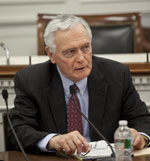 urope and the implications of the Euro zone crisis for America. Although one could debate whether the European the crisis began with the bursting of the American housing bubble, Wells said, the economy is global with particularly "dense" relations between the United States and Europe. Europe's delay in responding to the crisis and also faced its own problems ranging from housing bubbles in Ireland and Spain to significant accounting issues in Greece. In his view, these were also at the root of the crisis. In addition, the Euro zone lacks a single fiscal policy, resulting in different tax and budget structures in separate countries. Highlighting the importance of Europe's struggles for the 112th Congress, Wells warned that stagnation in Europe could be a large issue for the U.S. economy.
urope and the implications of the Euro zone crisis for America. Although one could debate whether the European the crisis began with the bursting of the American housing bubble, Wells said, the economy is global with particularly "dense" relations between the United States and Europe. Europe's delay in responding to the crisis and also faced its own problems ranging from housing bubbles in Ireland and Spain to significant accounting issues in Greece. In his view, these were also at the root of the crisis. In addition, the Euro zone lacks a single fiscal policy, resulting in different tax and budget structures in separate countries. Highlighting the importance of Europe's struggles for the 112th Congress, Wells warned that stagnation in Europe could be a large issue for the U.S. economy.
Rachel Barker, Intern, Wilson Center on the Hill
David Klaus, Consulting Director, Wilson Center on the Hill
Speakers

Blair A. Ruble
Former Wilson Center Vice President for Programs (2014-2017); Director of the Comparative Urban Studies Program/Urban Sustainability Laboratory (1992-2017); Director of the Kennan Institute for Advanced Russian Studies (1989-2012) and Director of the Program on Global Sustainability and Resilience (2012-2014)
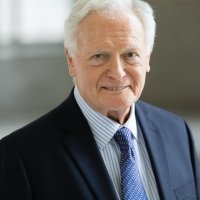
Samuel Wells
Former Deputy and Associate Director, Woodrow Wilson Center; Former Director, West European Studies Program, Woodrow Wilson Center
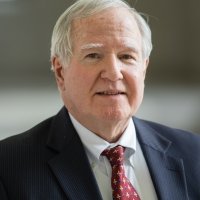
Kent Hughes
Former Director, Program on America and the Global Economy, Woodrow Wilson Center
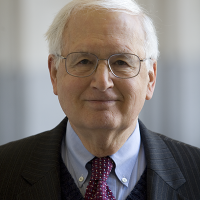
J. Stapleton Roy
Founding Director Emeritus, Kissinger Institute on China and the United States
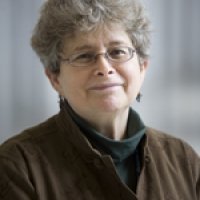
Sonya Michel, PhD
Professor Emerita, History and Women's and Gender Studies, University of Maryland
Hosted By

Urban Sustainability Laboratory
Since 1991, the Urban Sustainability Laboratory has advanced solutions to urban challenges—such as poverty, exclusion, insecurity, and environmental degradation—by promoting evidence-based research to support sustainable, equitable and peaceful cities. Read more

Kissinger Institute on China and the United States
The Kissinger Institute works to ensure that China policy serves American long-term interests and is founded in understanding of historical and cultural factors in bilateral relations and in accurate assessment of the aspirations of China’s government and people. Read more
Thank you for your interest in this event. Please send any feedback or questions to our Events staff.


